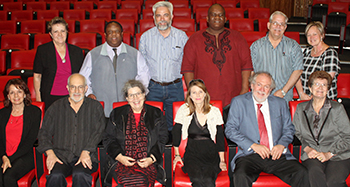Latest News Archive
Please select Category, Year, and then Month to display items
29 August 2024
|
Story Anthony Mthembu
|
Photo Harmse Photography
 Ross van Reenen, CEO of the Toyota Free State Cheetahs.
Ross van Reenen, CEO of the Toyota Free State Cheetahs.
The Business School at the University of the Free State (UFS) recently hosted the CEO of the Toyota Free State Cheetahs, Ross van Reenen, for a guest lecture. Van Reenen presented the guest lecture in the Business School Auditorium on the UFS Bloemfontein Campus on 21 August 2024.
Reflecting on Van Reenen’s address
In a lecture addressed to an auditorium filled with UFS staff and students, Van Reenen’s talk was divided into several sections. Firstly, he spoke about the concept of the ‘black swan’ in reference to the book written by Nassim Nicholas Taleb, titled The Black Swan: The Impact of the Highly Improbable. Referring to Taleb’s book, Van Reenen defined a ‘black swan’ as a rare event that has a severe impact, and the occurrence of which people try to explain. He used some examples to explore this concept as well as its implications, including COVID-19 and its impact on the world, and the tragic death of the people in the Titanic disaster. However, he delved deeper into 9/11 and the extent of its impact, saying that “9/11 was a major wake-up call in the world economy”. Van Reenen highlighted how some companies such as Barclays, for which he previously consulted, had to work to be up and running after the collapse of the Twin Towers in 9/11.
In addition, Van Reenen’s lecture also touched on the importance of the first ninety days of a job after an individual has been employed. “Those first ninety days are crucial, as you have to establish yourself in a company where you are paid less than you are worth,” Van Reenen said. As such, he gave the audience insight into what they could focus on in that time frame. This includes focusing on the small wins, as well as ensuring that you are working at keeping the team together, as the team is an integral part of an organisation.
Van Reenen concluded his address by speaking about his time as the CEO of the Toyota Free State Cheetahs, including some of the decisions he took to ensure the success of the organisation.
Special Edition of the Journal for New Generation Sciences launched at UFS
2016-10-26

Participants of the round-table discussion
at the launch of the Journal for New Generation
Sciences during the UFS Faculty of Education
colloquium which took place on 20 October 2016.
Photo: Oteng Mpete
The Journal for New Generation Sciences Special Edition was launched on 20 October 2016, at the Albert Wessels Auditorium, during the University of the Free State’s (UFS) Faculty of Education colloquium on the field of technological higher education and its contribution to the knowledge society.
Partnerships and knowledge production
Prof Laetus Lategan, Dean of Research and Innovation at the Central University of Technology (CUT), led the launch. “Higher education is not only about producing knowledge but it is also about fostering new relationships,” said Prof Lategan referring to CUT’s collaboration with the UFS Faculty of Education.
“Empowering people is important for capacity building, offering novice writers the opportunity to learn and a way to enhance their academic writing,” said Prof Lategan.
The Journal for New Generation Sciences is an accredited research publication in which scholars, internal and external to the institution, may publish. It accommodates national and international publications and showcases the university’s commitment to applied research.
Growing in leaps and bounds
According to Dr Somarie Holtzhausen, from the Faculty of Education’s School of Higher Education Studies, all papers are peer-reviewed by at least two experts. An editorial review also secures the quality of the paper. In 2014, when the journal was established, 30 contributions were submitted, although only 25 were successfully published.
“We turn down content not because it is not good, but unfortunately because it does not speak to the heart of the journal,” said Prof Lategan. With 60 peer reviewers, the journal’s contributors are assured that at least two peer reviewers will assess their article.
The Journal for New Generation Sciences supports both high-quality scholarly work of established researchers, and capacity building among new researchers.
During the round-table discussion various contributors to the journal spoke about their research and involvement in the publication of the journal.